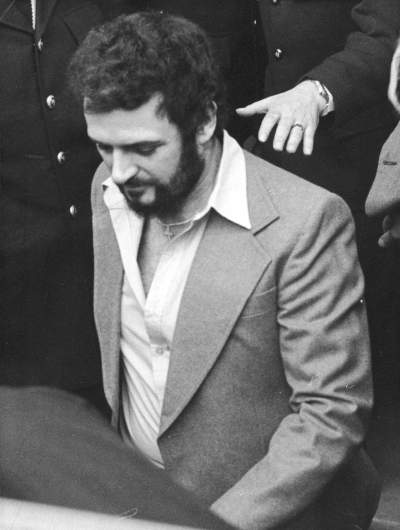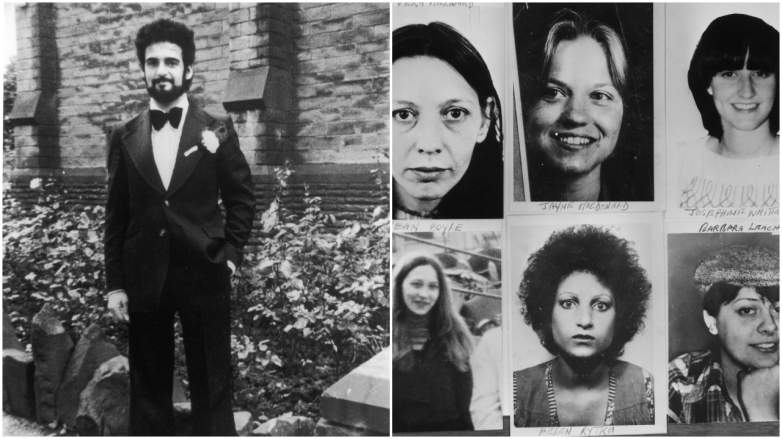
Peter Sutcliffe, the infamous British serial known as the “Yorkshire Ripper,” has died, according to the U.K. Ministry of Justice and global media on November 13.
What was his cause of death? The 74-year-old passed in a hospital after contracting the coronavirus, CNN reported. Sutcliffe was convicted in 1981 for murdering 13 women, as well as attempting to murder seven others, from 1975 to 1980, the station said. He was serving life behind bars at the Frankland prison, CNN continued.
Although varying news outlets claimed that Sutcliffe had underlying health conditions prior to his COVID-19 diagnosis, the prison service has not yet confirmed his cause of death, CNN said. The service is currently awaiting the coroner’s report, it continued.
BBC said Sutcliffe earned his nickname because he “mutilated his victims’ bodies.”
During his trial, the serial killer said God instructed him to kill prostitutes, CNN reported. Sutcliffe spent many years at the Broadmoor psychiatric hospital before he was transferred to the Frankland prison in County Durham in 2016, CNN said.
Here’s what you need to know:
Sutcliffe Killed His First Victim in October 1975, Less Than 1 Year After He Was Married
Less than one year after he was married, Sutcliffe killed 28-year-old Wilma McCann in October 1975, CNN said. She was a sex worker and mother of four, the outlet continued.
Sutcliffe “battered” the young mom “with a hammer” and stabbed her repeatedly, CNN reported.
“After that first time, I developed and played up a hatred for prostitutes in order to justify within myself a reason why I had attacked and killed Wilma McCann,” the future serial killer later told police, CNN said.
Throughout the span of five years, Sutcliffe’s 13 victims included 42-year-old Emily Jackson and 16-year-old Jayne MacDonald, CNN noted.
Sutcliffe Was Born in June 1946 & Worked as a Grave Digger

British serial killer Peter Sutcliffe in police custody, 1983.
According to The Guardian, Sutcliffe was born in June 1946 in Bingley, West Yorkshire.
He grew up as the oldest of six and had “no interest in football or the outdoors — something that “disappointed” his father, the outlet said.
“It became something of a joke in the Sutcliffe house that he liked to spend more time in the bathroom than all the women in the family put together,” The Guardian wrote.
At 15, Sutcliffe left school in 1961 to become an apprentice fitter, the outlet reported. His resume included varying jobs, such as a grave digger and a truck driver.
A Series of Police ‘Blunders’ & a ‘Hoax’ Allowed Sutcliffe to Carry on With His Killings for Years

GettyPeter Sutcliffe and six of his known victims. Top left to right; Vera Millward, Jayne MacDonald, Josephine Whittaker and bottom left to right; Jean Royle, Helga Rytka and Barbara Leach
Although police questioned Sutcliffe on several occasions, a “series of blunders and a hoax that led detectives to focus their search for a suspect on the wrong area of northern England allowed him to carry on killing undetected,” CNN reported.
The Guardian said Sutcliffe “escaped justice for so long owing to a mixture of bad luck and incompetent policing, with many early clues missed.”
A total of 40,000 interviews were conducted throughout the police investigation, the outlet noted. Sutcliffe was interviewed at least five times.
Police were also led astray by a “hoaxer with a Sunderland accent” who took credit for Sutcliffe’s crimes, The Guardian said.
Calling himself “Wearside Jack,” the hoaxer sent police a tape recording that said, “I’m Jack, I see you are still having no luck finding me,” according to The Guardian.
Sutcliffe was then discounted as a suspect because he “had a Yorkshire accent,” The Guardian said.
Sutcliffe Was Sentenced in 1981 to 20 Life Terms

GettyA statue of the scales of justice stands above the Old Bailey on February 16, 2015 in London, England.
In January 1981, Sutcliffe was arrested after police discovered he was driving with stolen plates, CNN reported. Street worker Olivia Reivers was a passenger in the car, the outlet continued.
Detectives later found a hammer and knife “nearby,” CNN said.
Sutcliffe was sentenced in May in the Old Bailey Central Criminal Court in London to 20 life terms, CNN disclosed.
Roughly 40 years later, one of Sutcliffe’s surviving victims told BBC that she is still affected by her attacker.
Mo Lea, who was assaulted in Leeds in October 1980, said she wrote Sutcliffe a letter while he was in prison, BCC said. She was 20 at the time.
“I was compelled to write to let him know how the fact that he was hanging on to the knowledge that he tried to kill me, was affecting me,” Lea explained to BBC.
“And I thought at least if I post it I’ll know that in some way there’ll be a level of understanding. I didn’t expect a response and I didn’t get one but it felt good to put it in the post box.”
West Yorkshire Police Issued a ‘Heartfelt Apology’ to Sutcliffe’s Victims & Their Families
Following news of Sutcliffe’s death, West Yorkshire Police Chief Constable John Robins issued a “heartfelt apology” to the serial killer’s victim’s and their family members.
In the release, Robins apologizes for the “language used by senior officers” throughout the investigation.
“On behalf of West Yorkshire Police, I apologise for the additional distress and anxiety caused to all relatives by the language, tone and terminology used by senior officers at the time in relation to Peter Sutcliffe’s victims,” Robins said in the statement.
“I am sure a lot of the families, surviving children of the victims may well be glad he has gone and they have a right to feel like that.”
The son of Sutcliffe’s first victim, Richard McCann, said Sutcliffe’s death brings him “some kind of closure,” BBC reported. McCann had previously called on police to apologize over their depictions of the victims who were sex workers, CNN added.
McCann’s son Richard, according to BBC, said, “The attention he’s had over the years, the continuous news stories that we’ve suffered over the years, there is some form of conclusion to that.”
READ NEXT: Sarah Hunt: Texas Teacher Fatally Shot Her Teen Son, Cops Say